Vast trading area in capital boasts proud history
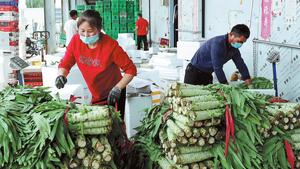 Vegetables are sorted at a makeshift trading area in Beijing on Monday after the Xinfadi market closed temporarily for disinfection. (ZOU HONG / CHINA DAILY)
Vegetables are sorted at a makeshift trading area in Beijing on Monday after the Xinfadi market closed temporarily for disinfection. (ZOU HONG / CHINA DAILY)
The new cluster of COVID-19 cases detected in Beijing has focused domestic and global attention on the sprawling Xinfadi agriculture wholesale market in the southwest of the city.
Covering an area the size of 170 soccer fields, the complex supplies more than 80 percent of the capital's agricultural produce.
People say Beijing has two places that never sleep-the Sanlitun restaurant, bar and entertainment area and Xinfadi, where vegetable and fruit sellers start trading as early as 3 am.
Buying such produce early in the morning at Xinfadi makes me happy. It feels rewarding — as though my life has been enriched
Li Tingzhen, Beijing resident
However, the market was previously known mainly only by workers in the farm produce industry and elderly people living nearby who shopped there for low-price vegetables.
Now, a huge number of people worldwide know of the venue due to the growing number of newly confirmed COVID-19 patients in Beijing.
As of Wednesday, there were 158 such patients in the city. The first new local infection was reported on June 11.
Pang Xinghuo, deputy head of the Beijing Center for Disease Control and Prevention, said at a news conference on Thursday that all these cases are linked to the Xinfadi market in Fengtai district.
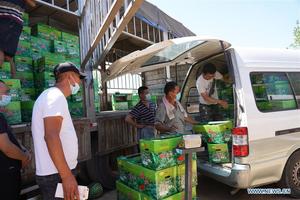 Fruit sellers unload watermelons at a temporary trading area in Beijing on Sunday. (JU HUANZONG / XINHUA)
Fruit sellers unload watermelons at a temporary trading area in Beijing on Sunday. (JU HUANZONG / XINHUA)
Two days after the first confirmed case was reported, the market closed temporarily when more infections related to the venue were found. The first confirmed case involved a person who had visited the complex to buy food.
By Sunday, more than 8,000 people who trade or shop at the market had received nucleic acid tests and been transferred to isolation locations for medical observation.
Some 200,000 people are estimated to have visited the market since May 30, based on a citywide data collection campaign conducted by communities. All of them will be given nucleic acid testing and will remain at home in self-isolation.
Before the latest cases occurred, Xinfadi was known affectionately as the capital's "giant veggie basket" and "fruit platter".
It is worthy of such labeling. Last year, more than 17 million metric tons of produce was traded at the market, with a turnover of 132 billion yuan (US$18.6 million).
Out of more than 4,600 domestic agricultural product wholesale markets, Xinfadi has ranked in first place for 17 consecutive years in terms of trading volume and turnover.
Founded on May 16, 1988, the market has expanded rapidly in tandem with the country's economic growth.
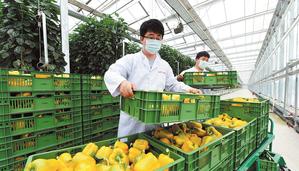 Workers at a farm in Xingtai, Hebei province, load peppers bound for Beijing on Tuesday. (ZHU XUDONG / XINHUA)
Workers at a farm in Xingtai, Hebei province, load peppers bound for Beijing on Tuesday. (ZHU XUDONG / XINHUA)
Initially, there were just 15 management staff members at the market, which was basically a bazaar standing on 1 hectare of land. The startup capital was 150,000 yuan.
During the past 32 years, many vendors have transformed their lives by working at Xinfadi.
Prices at the market are low and the paperwork is easy, which has attracted a large number of vendors from nearby districts and neighboring cities. As a result, the venue's size and trading volume have grown annually.
In 2002 and 2003, as the capital prepared to host the 2008 Beijing Olympic Games, several downtown wholesale markets had to relocate to improve both traffic and environmental conditions.
Many vendors who worked at these markets decided to move to Xinfadi, which lies about 20 kilometers southwest of the city center.
The market gradually became known for its fresh farm produce.
Li Tingzhen, who lives in a residential building near the venue, said he is among the first to visit it most days to buy fresh fruit and vegetables.
He also likes going to morning markets, but as their numbers are declining, he feels that he can get a similar experience at Xinfadi.
"Buying such produce early in the morning at Xinfadi makes me happy. It feels rewarding-as though my life has been enriched," he said.
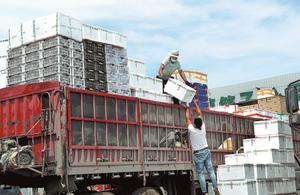 Vegetables are unloaded at a temporary trading area in Beijing on Monday. (ZOU HONG / CHINA DAILY)
Vegetables are unloaded at a temporary trading area in Beijing on Monday. (ZOU HONG / CHINA DAILY)
Busy buyer
The majority of buyers at the market are from restaurants, supermarket chains, fruit stalls and online farm produce shopping platforms. They visit from 3 am to 4 am each day to buy produce at the best prices.
Wang Han, who owns a small restaurant at the market, has been buying ingredients at Xinfadi for five years.
"I'm pretty familiar with the vegetable sections, where all the produce is clearly marked," he said.
"For instance, flowering cabbages from Beijing and Ningxia Hui autonomous region are placed on different stands, and various types of potatoes are provided by different vendors. You can always find what you need as long as you spend enough time there."
First-time visitors to Xinfadi will find it impossible to see all of the market in one day. However, Wang can complete his purchases within 30 minutes.
For his business to make a profit, he depends heavily on the market, as it supplies vegetables at half the price charged at other venues.
Wang Huajuan, who runs a small vegetable store in Beijing, relies on Xinfadi to make a living, according to news portal jiemian.
Facing fierce competition from supermarket chains, she can sell her vegetables at a lower price thanks to buying them from the complex.
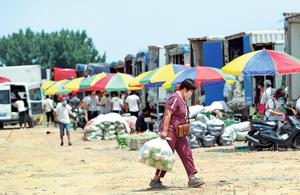 Vendors at the Xinfadi market move to a nearby temporary trading area. (ZOU HONG / CHINA DAILY)
Vendors at the Xinfadi market move to a nearby temporary trading area. (ZOU HONG / CHINA DAILY)
Many private businesspeople such as Wang Huajuan visit the market frequently to buy produce in an attempt to reduce costs.
After Xinfadi closed due to the new COVID-19 cases, many such businesses faced a shortage of stock for two days until Monday, when a temporary fruit and vegetable trading area started operating near the market.
On Tuesday, to ensure normal supplies of fruit and vegetables in Beijing during the temporary closure of Xinfadi, produce previously traded at the market was transferred to designated areas.
Wang Hongcun, an official with the Beijing Municipal Commerce Bureau, said that although the measures taken at Xinfadi have temporarily affected distribution channels, authorities are stepping up efforts to coordinate market resources, and food supplies in Beijing can be guaranteed.
By Tuesday morning, 2,100 tons of vegetables had been sold at the Xinfadi temporary fruit and vegetable trading area, a 20 percent rise on the previous day, according to the bureau.
"Many small vendors have come to trade at the temporary market, which shows they are confident about the control measures taken," Wang Hongcun said. "Turnover for farm produce at the venue is growing steadily."
He added that six other large wholesale markets across Beijing acted quickly to increase their vegetable supplies.
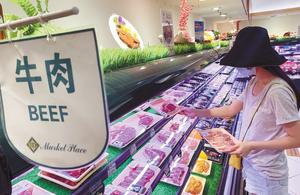 A customer selects beef at a supermarket in the capital on Monday. (WANG ZHUANGFEI / CHINA DAILY)
A customer selects beef at a supermarket in the capital on Monday. (WANG ZHUANGFEI / CHINA DAILY)
Rapid response
Supermarket chains also responded rapidly to ensure daily supplies for downtown areas.
For example, Beijing Jingkelong Supermarket Chain Co tripled direct purchases of vegetables from Hebei and Shandong provinces, ensuring stable and orderly food supplies in the capital.
Some cities in neighboring Hebei province have also taken steps to increase supplies of agricultural produce to Beijing.
Hebei Xinfadi, an agricultural produce wholesale market owned by the Xinfadi group in Gaobeidian, Baoding, has set up a 50 million yuan fund to organize and allocate farm produce needed urgently in Beijing.
"Produce being transported that was originally destined for Beijing can be transferred to Hebei Xinfadi," a notice issued by Hebei Xinfadi Agricultural Products Co stated.
The Xinfadi market in Beijing is among Hebei Xinfadi's shareholders, but the two venues have their own suppliers.
In Beijing's Xicheng district, implementation of an emergency plan is ensuring that food supplies reach the public. A temporary stock house has been set up to deliver vegetables directly to the capital from Hebei and Shandong provinces and Inner Mongolia autonomous region.
In Chaoyang district, online and offline platforms are being used to supply produce to the city, while many supermarkets have capped vegetable prices and promised not to raise them for the time being.
Meanwhile, the Xinfadi market remains closed and is being fully disinfected. The huge trading area stands eerily quiet, and it is hard to imagine just how busy it was.
However, Wang, the restaurant owner, said he believes it will soon become just as noisy as before.


